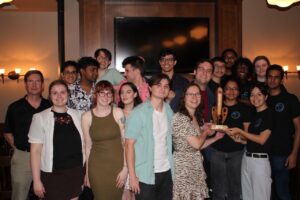 The UW Orbital team is celebrating an exciting win this month after taking first place in the Canadian Satellite Design Challenge (CSDC), which ran from May 29 to June 1. The CSDC calls for teams of university students to submit their satellite designs and participate in tests to assess their launch readiness.
The UW Orbital team is celebrating an exciting win this month after taking first place in the Canadian Satellite Design Challenge (CSDC), which ran from May 29 to June 1. The CSDC calls for teams of university students to submit their satellite designs and participate in tests to assess their launch readiness.
The satellites involved in the competition, known as “CubeSats,” are small research satellites capable of going to space.
The Orbital team had been working on their CubeSat for a long time before this year’s competition took place. “When we started in May of 2021, we were already kind of targeting [the CSDC] and trying to find a payload and just doing a lot of research into how satellites work,” team lead Aryan Kalia told Imprint.
As the team was then composed of first-year students, there was a lot to learn. “We had to learn things outside of [Orbital] and give back to the team lots of different technical skills- electrical, mechanical, software,” Kalia said.
After years of preparation and complications due to the pandemic, the competition provided an important step forward for the team. According to team lead Shreya Singh, “It was a bit of a chaotic process to say the least, but we all went in as friends and it was a super cool environment to be in, especially because we all worked hard.”
“It was also really cool to be around all the other teams from across Canada,” Kalia added. “We have been working closely and kind of sharing ideas with some of the teams. So it was nice to see them, nice to see the progress that they’ve made.”
Looking towards the future, the team hopes to take the next step and launch their satellite. “We’re going to try and look for other competitions that may include a launch, to actually make a space-grade satellite and to have that experience for our members,” integration lead Julia Empey explained.
Their recent win at the CSDC provided encouragement for the team. Singh said, “This is definitely a confidence booster for everyone, and definitely it’s gonna help with improvement. But I think the biggest part is that now we realize our potential as undergraduate students — we can do something that can go to space.”
As the team moves towards launching their CubeSat, they encourage students from other faculties to join in and support their efforts. Daniel Gobalakrishnan, lead of command data handling, said,“It’s not just engineering students that can contribute to satellite design. There are so many different things that you can do on our team such as writing and graphic design. So really, if you’re just interested in space, it’s a great way to get involved in the industry.”
To learn more about the team and how to join, their website can be found here.































